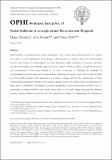Social isolation: A conceptual and measurement proposal

Download
Date
2014Author
Zavaleta, Diego
Samuel, Kim
Mills, China
Metadata
Show full item recordImpact
Abstract
Social isolation is a deprivation of social connectedness. It is a crucial aspect that continues to be named by people as a core impediment for achieving well-being and as a relevant factor for understanding poverty. The notion of social isolation has been discussed within a diversity of theories that have provided rich insights into particular aspects of social isolation. However, there is no agreement on the core components of this social malady or on how to measure it. Although the challenge of conceptualising and measuring social connectedness is daunting, this paper argues that existing research in several fields provides solid ground for a common concept and for the construction of basic internationally comparable indicators that measure specific aspects of social isolation. In particular, this paper aims to contribute to the debate on social connectedness and its measurement in three ways: (1) presenting a working definition that, while doing justice to the rich insights advanced by different theories, stresses relational features in the life experience of people; (2) emphasising the relevance of isolation for poverty analysis; and (3) proposing some indicators to measure social connectedness that could be feasibly incorporated into a multi-topic household survey.

